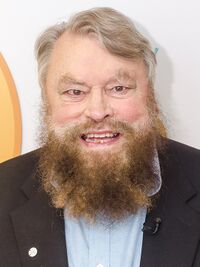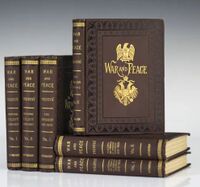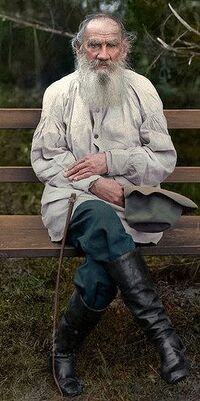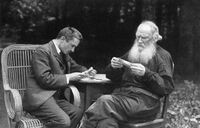Leo Tolstoy
“Dostoe... Dostoy... Dostoi... Dostoj... ah we'll just go for Tolstoy.”
“A good book is like a good beard: the longer it is, the better it is.”
“What is that noise??!”
Leo Tolstoy (b. 1828, d. 1910) was a Russian author who wrote the only book known to be longer than the The Bible. This book, War and Peace, is a book so large that light cannot escape its surface. War and Peace is so large it has to be viewed on a clear night using a telescope. He wrote some other books too, but no-one really remembers those. He was also known as Gandalf the gray.
The original copy of War and Peace (originally titled War: What is it Good For? Huh! Absolutely Nothing Say it Again but it was his mistress that insisted he call it War and Peace) is also the fourth largest object in the solar system after the Sun, Jupiter and Saturn. It orbits between Pluto and Neptune. The pull of gravity from War and Peace has been blamed for everything from September 11th to the sudden disappearance of the bees.
After completing War and Peace, Tolstoy retired to the Russian countryside. He let his beard grow and always wore shapeless smocks to immitate the Russian peasants. His reputation survived revolutions and scandals. Today Tolstoy is still considered a literary giant and the best man to sport a beard since Charles Darwin. One of his descendants is the British actor Brian Blessed (having anglicised his name from Brian Trotsky).
Childhood[edit]
Leo Tolstoy had a normal Russian childhood, until the age of six. After a hard night of drinking vodka with his friends from grade school, Tolstoy was confronted with a drunken bet: write a book so long that even God couldn't be bothered to know how it ended.
Tolstoy took the bet, and spent the better part of his life writing his masterpiece. Well, actually, people assume it was a masterpiece, because who's really going to challenge you if you say it is?
The book[edit]
War and Peace encompasses over 13,200 main characters spanning an unknown number of pages. War and Peace is so huge, it straddles 93% of all genres ever imagined, featuring anime, blacksploitation, mafia true crime, feminist soft pr0n, gay interest, revisionist history, Star Wars fanfic and infomercials.
Oddly, while the title is War and Peace, no one has ever been able to get to the part where peace occurs. While the book begins with the Napoleonic Wars, the farthest anyone has ever beer able to read the story has only progressed to Day Two by page 23,491. Many critics insist the book, like war, doesn't actually end. An entire branch of science fiction is dedicated to speculating what the peace part of War and Peace might actually be like.
Two whole chapters of War and Peace appear to be the letter S typed repeatedly. Tolstoy later claimed he added the chapters just to see if anyone had actually read that far into the book. One chapter seems to presage the exploits of American football player Bo Jackson. Another chapter appears to just be a recipe for curried chicken. And another has step-by-step instructions for operating the system menu on a Magnavox HDTV.
The ending[edit]
No one knows how War and Peace ends. Tolstoy deliberately rigged the ending to ensure no one could skip to the last page. The ending is so contrived and convoluted that anyone who reads it without first reading the rest of the book will lapse into a coma that cannot be reversed.
In 2003, NASA had a robotic spacecraft do a fly-by of War and Peace, to take pictures of the ending page. The probe was unable to take a complete photo of the page. However, researchers believe the ending has something to do with an old man dressed up as a ghost trying to scare young people away from his farm.
Tolstoy's life after War and Peace[edit]
Leo Tolstoy finished War and Peace at the age of 58. By the time he got the book back from the publisher, the world had changed so much that Tolstoy could no longer bear to live in it. In the time it took Tolstoy to write War and Peace, two world wars had come and gone, man walked on the moon, disco died out, communism came and went, we found out that "it" was just a fucking Segway and Marilyn Monroe was twice elected President of the United States.
Once he was shot of War and Peace, Tolstoy jumped straight into his next book. This was titled Anna Karenina about a woman in an unhappy marriage who dies in a train spotting accident. It was published with 864 pages including songs, jokes and a lengthy exposition on beards. It was about half the length of War and Peace and so considered to be 'light reading' for literary Russians. Tolstoy's last completed book was Resurrection. This was an equally grim story of abuse, rape and imprisonment. A jolly read indeed.
Throughout his life he was burdened with supporting his younger, less successful brother Vasily, who tried to gain notoriety as a writer because of his connection to Leon. However, Vasily could not write worth a damn and was supported by Leo. Often when Vasily could not afford food, Leo would breast feed him[1].
Death[edit]
Tolstoy died in 1910, coincidently in the same year as Florence Nightingale. They met in the Crimea when Tolstoy was a soldier in the Russian army. Tolstoy said it was a platonic relationship as he wasn't attracted to the foreign woman and her lamp.
Tolsty's death was widely mourned in Russia. Not so much by the Russian elite who thought Tolstoy's later writings had shown his political interest in anarchism and communism. However today all Russians profess a deep love of Tolstoy, claiming that though he only wrote three novels, he is an equal to Victor Hugo and Charles Dickens.
Another event in 1910 was the Mexican revolution. This may also have been caused by Tolstoy as Russians were popular in that country. Many years later another writer called Leon Trotsky found a similar acclaim when he moved there in the 1930s.
Notes[edit]
- ↑ Like Alec Baldwin does for his brothers




